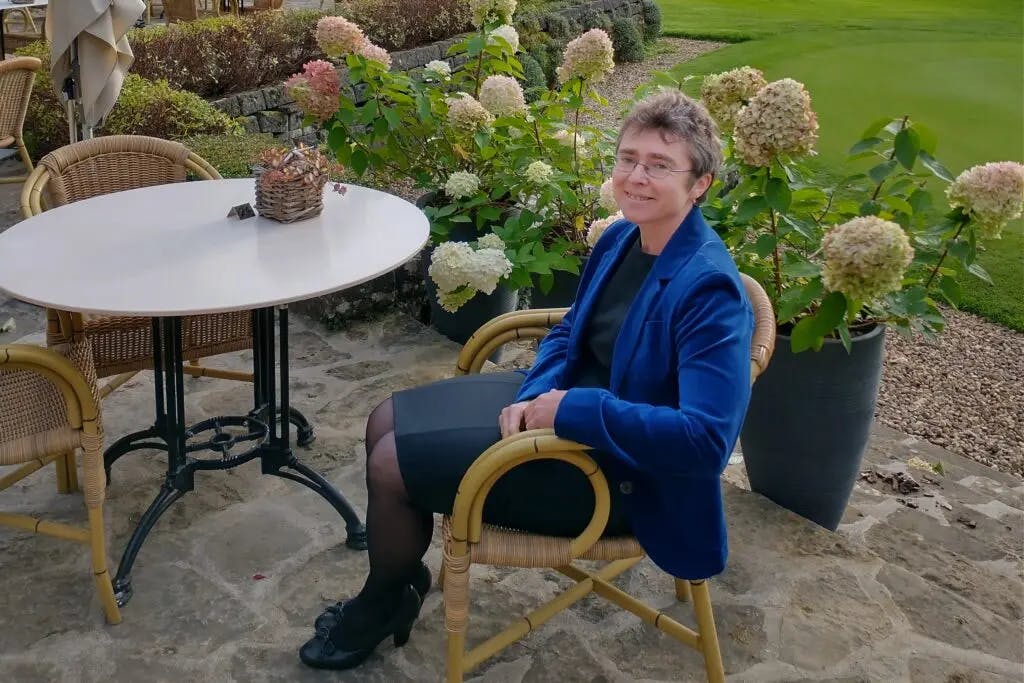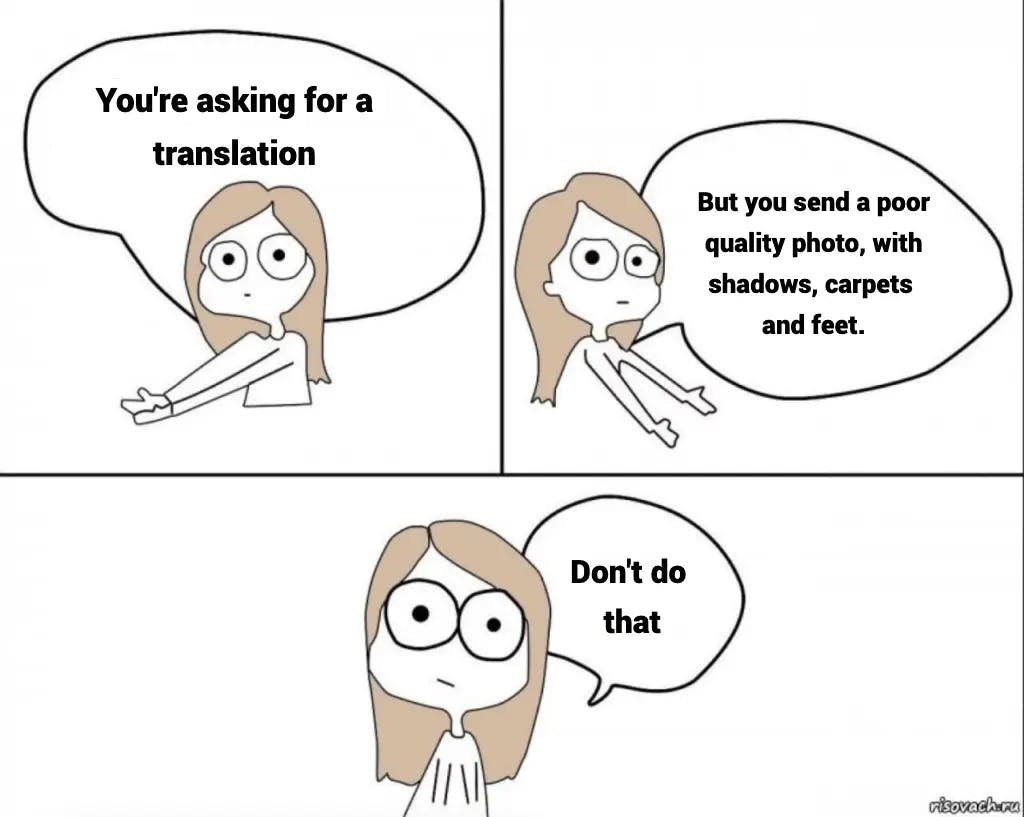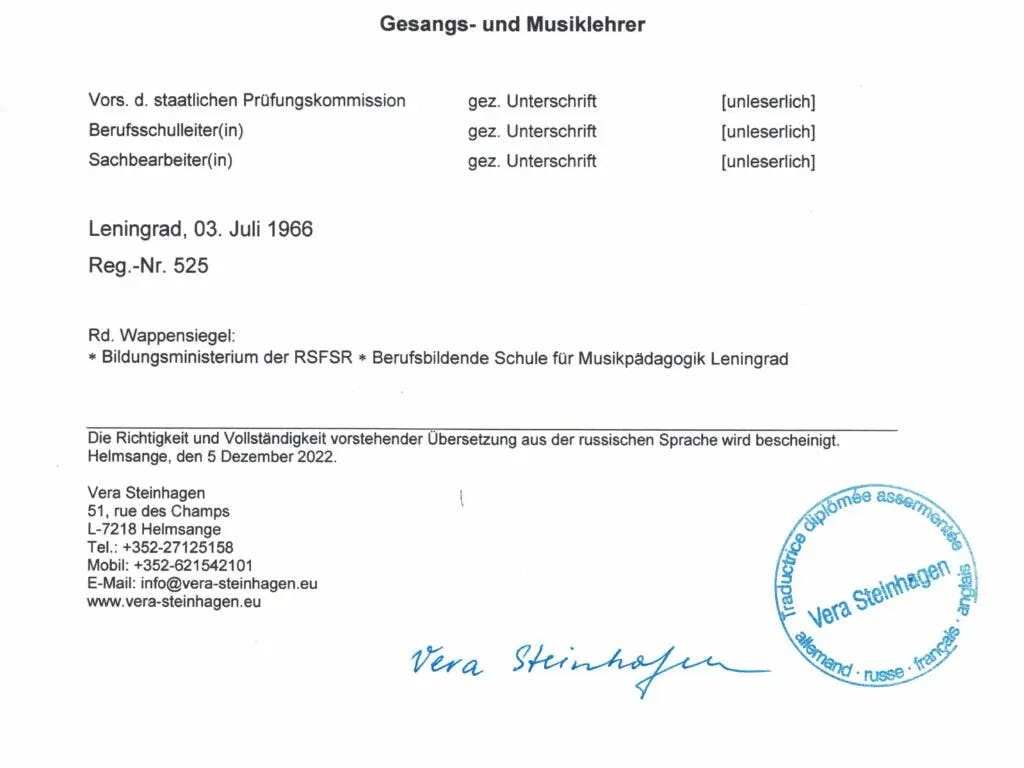Sworn Translator in Luxembourg: Rules, Documents, Experience

An interview with a sworn translator about working in Luxembourg, document translation, apostille rules, languages, and common client mistakes.

My name is Vera Steinhagen. I worked as a Court-sworn translator in Germany for 8 years and when I moved to Luxembourg, I decided that I would fight for my specialty to the last drop of blood.
Preparing for the move
I prepared for my move to Luxembourg in advance, while I was still working in Berlin. I looked up on the Internet what documents were needed to take the oath. In my case, they were:
- a certified copy of my diploma,
- a certificate of no criminal record,
- an autobiography;
- a free-form application.
That's all, basically. There was no need to confirm qualifications (maybe, since the diploma was obtained in Germany). However, it was 13 years ago. Now it is necessary to pre-register the diploma in the register of diplomas of the Ministry of Education, but this is a purely formal procedure.
Nevertheless, I crossed the border on Thursday, and the next day, Friday, I brought the documents to the Ministry of Justice in person. Four months later, I was invited to be sworn in.
So here I was pretty quickly back to my Court-sworn translator duties.
Who is a Court-sworn translator
A Court-sworn translator is a professional who has the authority to certify translations with his or her signature and seal. He or she swears on oath that he or she will faithfully translate the written texts and statements entrusted to him or her, whatever they may contain.

After taking the oath, a seal may be ordered. The imprint of the seal and a specimen of the personal signature are registered with the Ministry of Foreign Affairs. A translation certified by such a signature and seal must be accepted by all official authorities in Luxembourg.
The translator is not dependent on a notary: the signature does not have to be certified again, the translator himself certifies the correctness of his translation.
A sworn translator is not a government employee. However, the state delegates certain functions to them.
Sworn translators are used by people who have certain relations with the state. For example, a person needs to submit documents for a marriage license, a company needs to send an extract from the commercial register to the bank, parents need to formalize their child's citizenship, etc. And these clients' documents are in a foreign language. They go to a sworn translator, get a signed and stamped translation, and submit it to the right organization.

There are also government assignments, mostly from the courts and police. If the case involves a person who does not speak the local language, the interpreter must accurately translate the words of the government representative and translate the answer with the same accuracy.
Most of the time, however, I work with documents.
How to properly prepare documents in your home country
First of all, it is necessary to distinguish the category of personal documents. These include:
- birth certificate;
- marriage certificate;
- certificate of dissolution of marriage;
- certificate of change of surname;
- death certificate (this is a special document: so far no client has brought their own).
All personal documents must be apostilled. An apostille is stamped only by the state authorities of the country that issued the document. No one else can do this.
When a person in Luxembourg has any relations with the state, the state asks him/her to submit the relevant personal document, sometimes with an apostille.
Diplomas do not have to be apostilled. Some people have an apostille on this document, but they accept it without apostilization. So you don't have to spend extra money and time.
Translation should be kept to an absolute minimum! Only those documents that are directly required for entry into the country.
Translators are subject to what are known as territorial restrictions. A country has the right not to accept a foreign translation. Sometimes a person gets through at first, but then the translation has to be done again.
Example: a person enters a country, lives here, and 10 years later gets married. He has an old document that was translated in his home country. It will probably not be accepted because the translator was not Luxembourgish!
More simply, you should translate the document where you intend to use it. Then there will be no problems.
This restriction also applies in the opposite direction. Luxembourg sworn translators work for the Grand Duchy. For example, if you need to send a translated document to another country, the translator's signature must be certified at the consulate. Then it will be accepted there.
How many languages to translate into
Luxembourg has 3 official languages: German, French and Luxembourgish. Traditionally, documents are translated into German or French.
It's enough to choose some one, you don't need to transfer to both!
Contrary to popular belief, English is not a national language. However, some government agencies will accept documents translated into English.
For example, the Ministry of Foreign Affairs may accept documents in English for a visa, and the Ministry of Education may accept a diploma. The Ministry of the Interior also changed its policy a few months ago to accept documents and translations in English.
It is important to understand that the government may or may not accept your documents translated into English.
Documents/translations in English will not be accepted by the court or the police. Even if both the policeman and the person coming to the police speak English, the report will be written in German or French and an translator will be called in for the final review.
What I'm saying is that it's safe to translate into French or German, but not always into English, depending on the authorities for whom the translation is intended.
I already have a translation, you can certify
When I hear this question, it makes me very sad. In the rarest of cases, the finished translation comes to me in Word format. Most often it's a PDF. And it's grainy, low resolution. What should I do with it?
Let's say I can run it through OCR (a program that converts images to text, or PDF to DOC — ed.) and hope it takes it into account. Then I can try to make corrections there, and I'll have to make them anyway.
It is not possible to simply sign and stamp the sent PDF.
The sworn translator must carefully review the finished translation, compare it with the original, make the necessary corrections, write that the translation is certified, and provide his or her name and address.
Bottom line: if you are going to ask a translator to certify someone else's translation, it should at least be in Word format.
I need a translation today!
As a rule, translators are not rushed, but given reasonable deadlines. But sometimes circumstances are such that a translation is really urgent: for example, you have managed to make an appointment for the next day. In such cases, I consider it my duty to translate standard documents in one day.
In 20 years of work, I have created many templates for a wide variety of standard documents in different languages — from marriage certificates to tax returns or extracts from the commercial register. The longer you work, the faster you get.
I don't charge extra for it. I think it's the right thing to do. I don't like to hold people up.
It should be understood that we are talking about simple documents. No one is going to promise to translate a 20-page contract in one day. It is almost impossible.
When accepting an order, every professional translator always assesses whether he/she will be able to complete the ordered amount of work within the given time period. And in some cases it is more honest and correct to refuse.
What can speed up a translator's work
Like other colleagues, I often ask customers to send me a scan of a document. This can be done with a scanner or an app on a cell phone. And many send good, clean scans.
What else do they send? A grainy, low-resolution camera shot with a cell phone shadow. Or a dark photo of fingernails holding up a document. They send documents against a carpet, a photo of feet. But my personal favorite is a crumpled piece of paper on the floor =)

This is risky: first, it is much harder to see numbers and small print on a blurry, dark photo than on a clear scan. Second, it takes a lot longer to work with a poor-quality document, so it is often easier to refuse such work altogether.
And most importantly, the translation is always accompanied by a scan/photo of the original document. Why would government agencies want to see a carpet, a tablecloth, a person's fingernails, or a black piece of paper with nothing written on it?
How to choose the translator
Not a trivial and rather complex question.
Understand that the translator takes an oath in certain languages
A sworn translator cannot certify a translation from any language to any language. Each of us has a certain number of languages for which we are sworn. That is, I have the right to certify translations from Russian, French, German or English into any of these languages. But from Belarusian or Ukrainian, for example, I cannot — there is no oath, although the content of the document may be clear.
The list of absolutely all sworn interpreters is published on the website of the Ministry of Justice. There is a clear division by language.
If you need a translation from Russian, go to the website and look at the list of Russian sworn translators. For example, if you need a translation from Polish, go to the list of Polish sworn translators. It may happen that a rare language is not represented in Luxembourg. For example, Uzbek. What can you do? Look in the larger EU countries where there are translators of this language.
It seems possible to translate your documents from a rare language locally into English, and then in Luxembourg into French or German. However, there is a risk that the translation will not be accepted. And there have been such cases.
Choose not by agency size, but by order size
Another important point. Some people go straight to large agencies for translation, thinking that since they are well-known, they will do the right thing. Of course they will, but there is a catch.
Large translation agencies go through a complete administrative process, which drives up the price significantly. In fact, you should go there if you have a big (really big!) pile of papers that need to be processed in a short period of time, or a company website that needs to be translated into different languages. If the job requires serious project management.

If you need several documents translated, you should contact an individual translator or a small agency directly. For such jobs, project management is less important.
Also, you will be dealing with a specific person. He or she will be working with your document, which means that you will be able to find out everything quickly and easily, without intermediaries, and most importantly, he or she will be able to ask you directly what you don't understand.
What a sworn translator is not authorized to do
We are not authorized to certify original documents. A sworn translator only works when there is a translation. That is, if a person comes to me and says "give me a power of attorney", I will refuse, because that is the job of a notary, it is outside my competence.

It is a different matter if a person comes and says: "I have a power of attorney in English, it is already notarized, I need a translation to use it in Luxembourg. That is my job, I will translate the original text and certify the translation. It is important to remember that a sworn translator is not a notary!
Therefore, the translator is not responsible for the authenticity of the document he has to translate. He is only responsible for the accuracy of the translation.
We cannot authenticate a signature, certify a power of attorney, or even apostille! We can only certify the accuracy of the translation.
You are also not allowed to translate your own documents. This is where the principle of interest comes into play. When notarizing contracts, the notary always asks the translator if the clients are his relatives and notes that they are not.
Luxembourg in brief. Pros and cons
Luxembourg has so many advantages. I will try to highlight the most important ones:
- Accessibility of the administration;
- The MyGuichet.lu portal! It's brilliant!
- Lots of hiking and biking trails close to home;
- Extremely low unemployment;
- Multilingualism: a translator has to keep all her languages up to date;
- Free transportation and active government policies to promote "soft mobility";
- Nature;
- Apple picking at the plantation in Steinsel every September =)

Of course, the country also has its drawbacks:
- The downside of multilingualism: keeping up with multiple languages is very difficult, and not just for the translator.
- Expensive housing! Was there anyone who didn't mention it?
I love Luxembourg. It has many more pros than cons. What advice do you have for those coming? Be prepared to put a lot of effort and time into integration. It is very difficult, often painful, but worth the effort.
Read our Relocation Guide to find out what the entry requirements are, what documents you need to prepare, and other important information:
Share your stories with us. If you would like to tell us about moving to Luxembourg and about life here, please write to our editors via Telegram or email editorial@luxtoday.lu. One person's experience can help many.